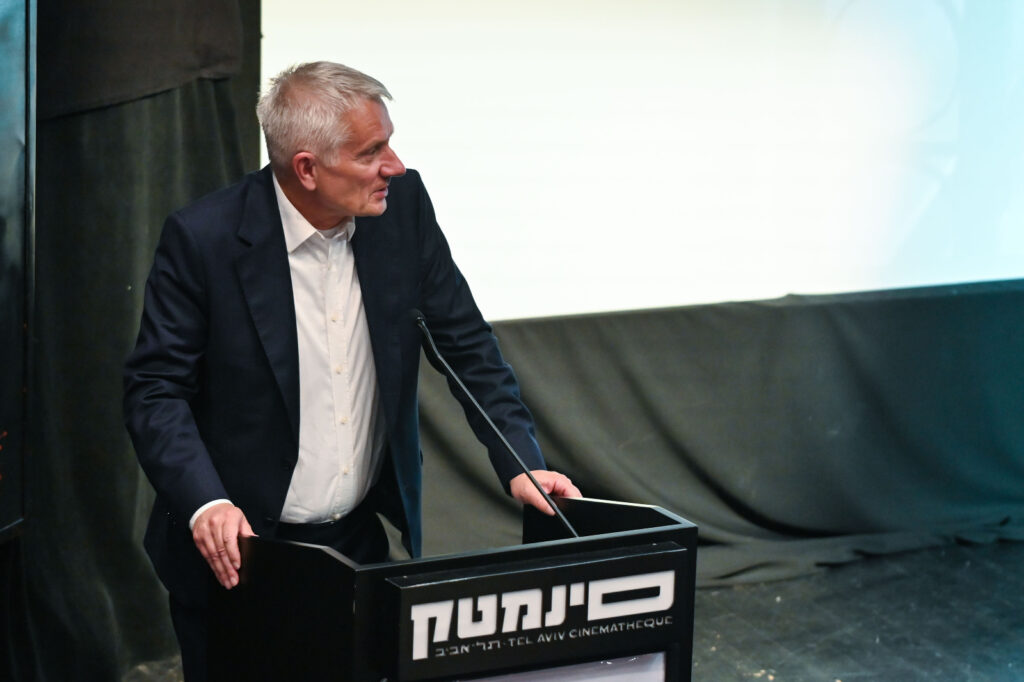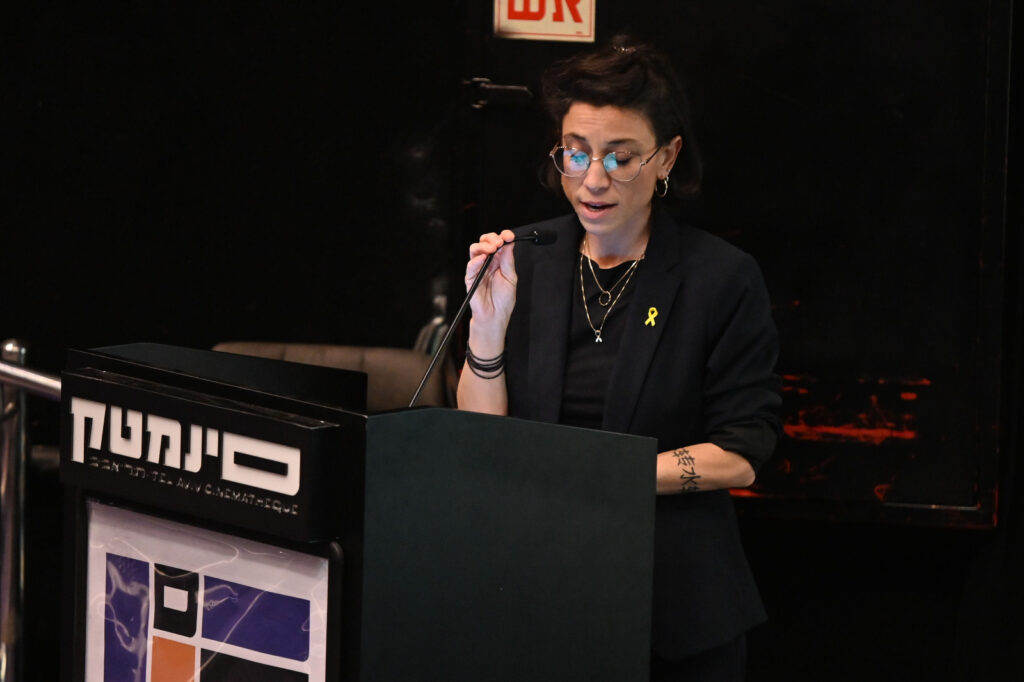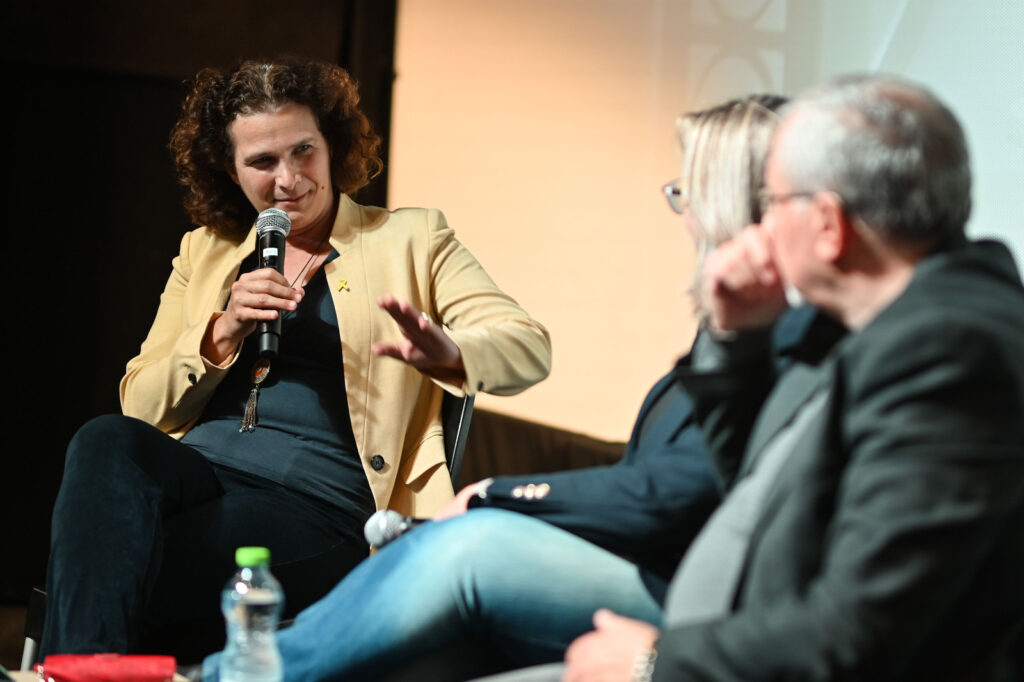On April 7, 2025, we held the Solidarity Festival at the Tel Aviv Cinematheque, focused on activism. We screened the winner of the festival’s Best International Feature Film award: “Under Gray Skies” (Poland, 2024). The film depicts the reality of two political activists in Belarus, Katsiaryna Andreyeva and Igor Ilyash. The event was moderated by Zulat’s CEO, Einat Ovadia.
Before the screening, a panel was held on “Journalism, Freedom and Oppression: The Struggle to Preserve Democracy,” moderated by former MK Ksenia Svetlova, CEO of ROPES for Regional Cooperation, with panellists Odeh Bisharat, writer and columnist for “Haaretz,” and Prof. Karine Nahon, Dean of the School of Communication at Reichman University.
The Polish Ambassador to Israel, Maciej Chonja, also attended. He said: “The topic you will discuss and the subject of the film are very close to my heart. Freedom of Expression is critical – it is a major threat to totalitarian regimes and authoritarian leaders.”

Zulat’s CEO said: “A year and a half since the October 7 massacre and 59 hostages are still in Hamas tunnels. They need to come back home, all of them, now! But instead of working for their release, the Prime Minister is busy dismantling the justice system and dismissing the Attorney General. He is busy subverting the security system and removing the head of the Shin Bet, in order to appoint a puppet, so that he can have his own secret police, to go after his opponents. And he is working to eliminate free press and public broadcasting, eliminating freedom of the press and harming journalists, while strengthening propaganda channels that are mouthpieces of the government. The Knesset (Parliament), controlled by a racist coalition, is passing misogynistic and anti-democratic legislation that seeks to silence us – it seeks to take away our freedom of protest and suppress our criticism, it seeks to shut our mouths and severely harm civil society that expresses strong opposition to the government’s actions.”

Former MK Ksenia Svetlova said: “We need solidarity. We have much to learn from the brave men and women who continue to resist, here and in different places around the world. Stay on and continue to fight for what is right – this is a very important message we can take from here.”
Writer Odeh Bisharat said: “What happens in the territories, and then happens to (Israeli) Arabs – eventually happens to Jews, and that’s the nature of the rolling snowball. A word about freedom of expression: Many years ago, when my daughter was young, we sat and argued in the family about Arab society – and there were generational disagreements about the roles of men and women between her and her grandfather. I was surprised by the passion she had to express her opinion at a relatively young age on issues of equality. So I say: what characterizes a person is their opinion. A person is their opinion. That’s what characterizes them. Opinion pushes us to speak. And this, I think, the regime wants to suppress, for us to be without opinions. A person without an opinion can be many things, but not themselves. I feel they’re telling Arabs: don’t talk. Find other ways to express yourself. And that’s dangerous. Those who cannot speak will act. And that’s the intention of the government: for them to act, because they like Arabs to take negative actions, as it gives them weapons against them. There is no Arab news presenter. In all news panels, there are almost no Arabs. All Jews gather together and conduct the discourse among themselves, and (Israeli) Arabs are not allowed to enter because they will spoil the party. The Arab is outside the room. There is segregation of Arabs. ‘Haaretz’ is not an elitist newspaper. If you write facts, that in Gaza so many are hungry, or about aid workers, is that elitism? These are facts. People don’t want to hear it. People are full of anger about what happened on October 7 and cannot free themselves from it. I understand them. But that’s not a reason to kill 50,000 people.”

Prof. Karine Nahon said: “It is the more complex things that happen in democracies against journalists and citizens. Democracies with populist leaderships. Not when people are silenced, but when people are allowed to speak. Techniques of gaslighting, delegitimization and others are used, and then they say ‘here, there is freedom of expression, what do you want?’ The gatekeepers are weaker, there is no opposition, but ‘there is ‘freedom of speech’. So I think it’s actually complicated not when they tell you ‘don’t speak’, but when they tell you ‘speak,’ what difference does it make. I do believe that the media is a very essential gatekeeper of democracy, and in the State of Israel not many gatekeepers remain. The gatekeepers in the last two and a quarter years have become very weak. Journalists have a very important role. I’m afraid of self-censorship – how many stories were buried and we don’t know about them? How many things happened that we don’t know about because they weren’t published?”
Watch (Hebrew, no subtitles):





